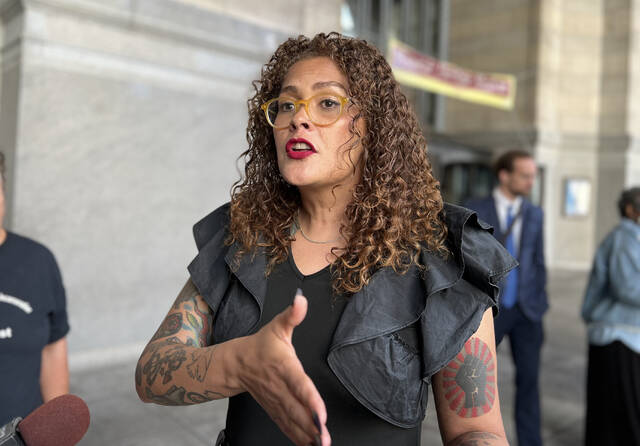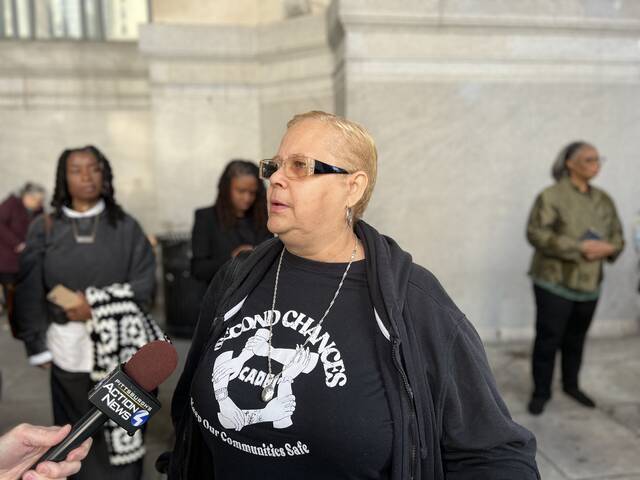Nearly 200 spectators packed a Pittsburgh courtroom Tuesday as the Pennsylvania Supreme Court heard arguments on whether the mandatory sentence of life without parole for second-degree murder violates the state constitution.
The punishment, often called death by incarceration by opponents, applies to nearly 1,100 people in Pennsylvania currently serving time for the crime also known as felony murder.
Opponents say it violates legal prohibitions against cruel punishment.
The case at the center of activists’ efforts to change the law involves Derek Lee, a Penn Hills man serving life for second-degree murder. Gov. Josh Shapiro is supporting Lee’s efforts.
Bret Grote, the legal director of the Abolitionist Law Center, represents Lee, who was convicted in 2016.
Grote told the seven justices that if his client’s sentence is not struck down, Lee will some day die in prison because of the unintended consequences of his crime.
“This must no longer be the case in Pennsylvania,” Grote said.
The crime
Lee, 36, and a co-defendant, Paul Durham, entered the home of Leonard Butler in the Elliot section of Pittsburgh on Oct. 14, 2014, during a home invasion.
Lee ordered Butler and his girlfriend into the basement and demanded money from them. Butler handed over his watch, and Lee went upstairs in the home, leaving Durham and Butler in the basement.
Butler attempted to lunge at Durham, the girlfriend testified at trial, and Durham shot him.
Both Durham and Lee were found guilty of second-degree murder.
Lee appealed his conviction, arguing that a mandatory life sentence in a case where he never intended to kill the victim is unconstitutional.
Although the state Superior Court ruled against Lee in June 2023, in February, the state Supreme Court decided to take up the case.
Legislative fix
As argument began Tuesday, dozens of people stood lining the walls of the courtroom. Many of them had traveled from Philadelphia to support Lee.
The justices spent 50 minutes grilling Grote on his position and the specific remedy he is seeking.
While Grote wants the court to strike down mandatory life without parole as unconstitutional under Pennsylvania law, he argued that the problem must ultimately be addressed by the state legislature.
“You can’t make them change it without striking it down for being unconstitutional,” Grote said.
He suggested to the court that once it issues an opinion declaring the punishment illegal, that the opinion be placed on hold, and the court then give the General Assembly time to rewrite Pennsylvania’s parole code.
Ideally, the legislature would set a minimum prison sentence for those convicted of second-degree murder before they become eligible for parole, Grote said.
Chief Justice Debra Todd asked Grote if there are ever cases where life without parole is appropriate for felony murder.
Grote would not acknowledge that and said that such a stiff sentence for a crime in which there is no intent to take a life is disproportionate to the legitimate purposes of punishment.
Justice P. Kevin Brobson countered that Lee engaged in a violent home invasion, entered with a gun and pistol-whipped the victim. He questioned whether Lee’s was the case that exemplifies the problem with the underlying charge.
“We’re not arguing there shouldn’t be severe penalties for second-degree murder,” Grote said. “Life with parole is a serious penalty.”
Allegheny County Assistant District Attorney Kevin McCarthy told the court it appeared to him that instead of challenging the sentence, it appears Lee is challenging the felony murder doctrine.
“I can’t seem to find exactly where the appellant is going and what he wants,” McCarthy said.
Justice Christine Donohue said that defendants are being punished for murder even though there is no intent or recklessness established.
“That’s the argument for why it’s cruel,” she said.
‘We need to catch up’
Dee Dee Haw, who opposes sentences of life without parole for felony murder, traveled to the argument from Philadelphia.
Her son has been in prison for 30 years for second-degree murder.
“We’re not asking that the doors be open or just let everybody out,” Haw said. “At least give them an opportunity.”
Celeste Trusty, deputy director of state policy for Families Against Mandatory Minimums, said after the argument that Pennsylvania is an outlier on this issue.
“There are only a few other states that carry this mandatory life-without-parole sentence for second-degree murder. We need to catch up. It’s an embarrassment that we are still this way.”
Trusty formerly served as secretary of the Pennsylvania Board of Pardons during the final year of the Wolf administration. She said that if the law were changed to have people convicted of felony murder serve, for example, a minimum of 20 years in prison before becoming eligible for parole, that would be a long time behind bars.
“Who among us is not different 20 years ago versus who we are now,” she said. “We all have the capacity to change. Mandatory sentences do not allow a judge to take a look at who a person is, and then there’s no hope.”
But McCarthy countered in his argument that defendants are being punished for their behavior.
“You are being punished for participating in a violent crime that was foreseeable,” McCarthy said. “Participating in a violent felony is dangerous conduct.”
In April, Shapiro took the unusual step of filing a friend-of the-court brief on Lee’s behalf.
Shapiro argued that the punishment for first-degree murder — and intentional killing — should not be the same as one for felony murder where there is no intent to kill.
He called the sentencing scheme unjust.













